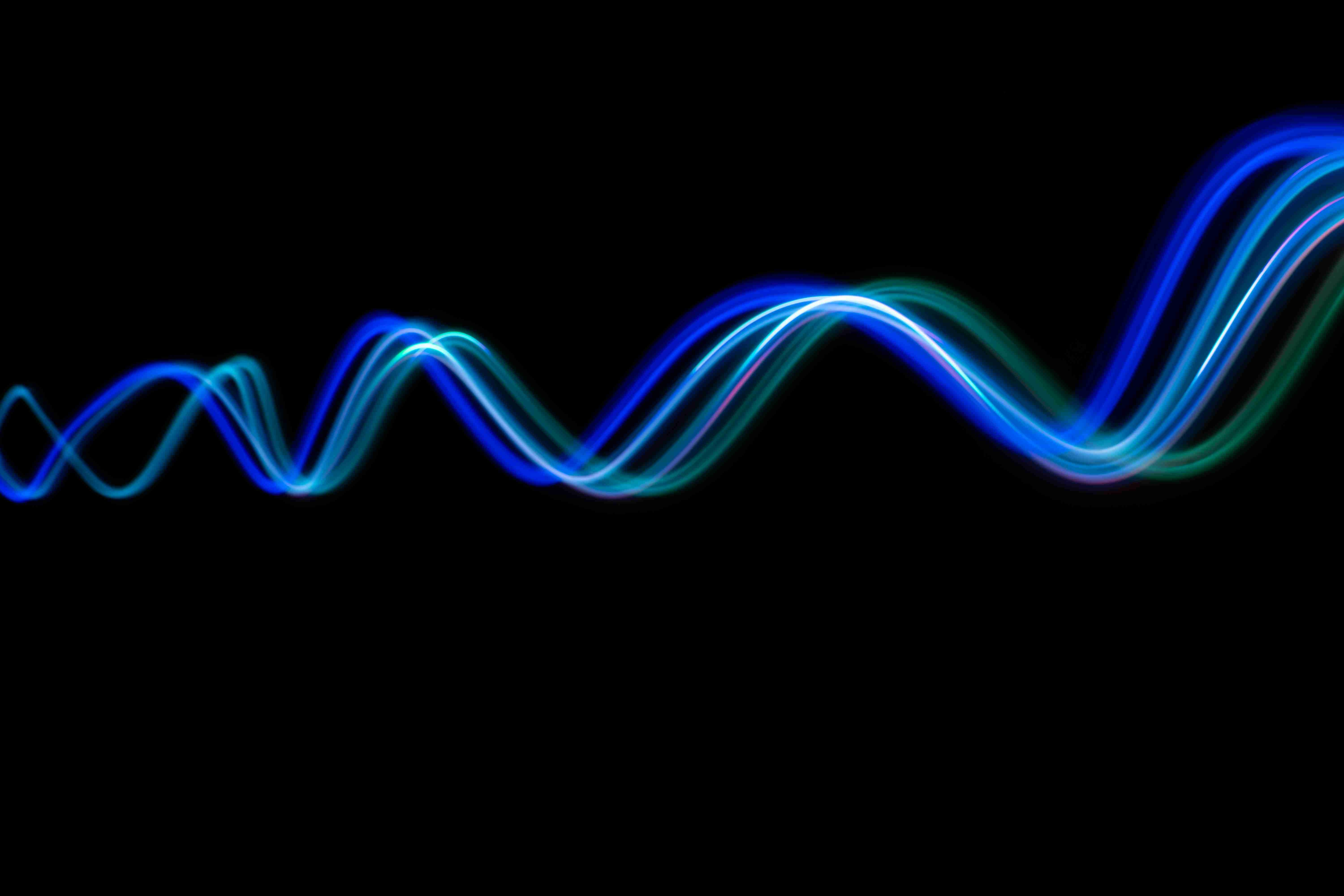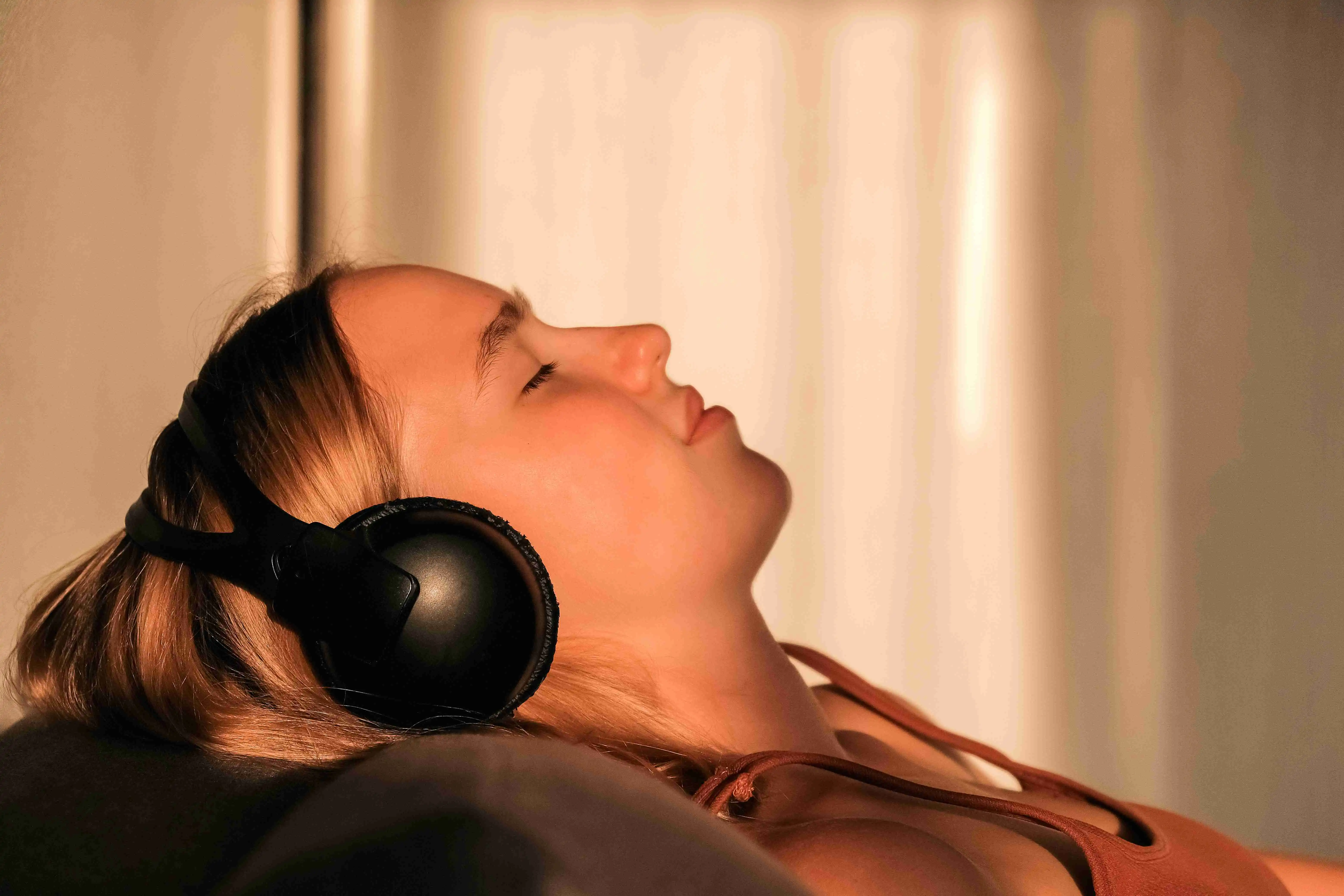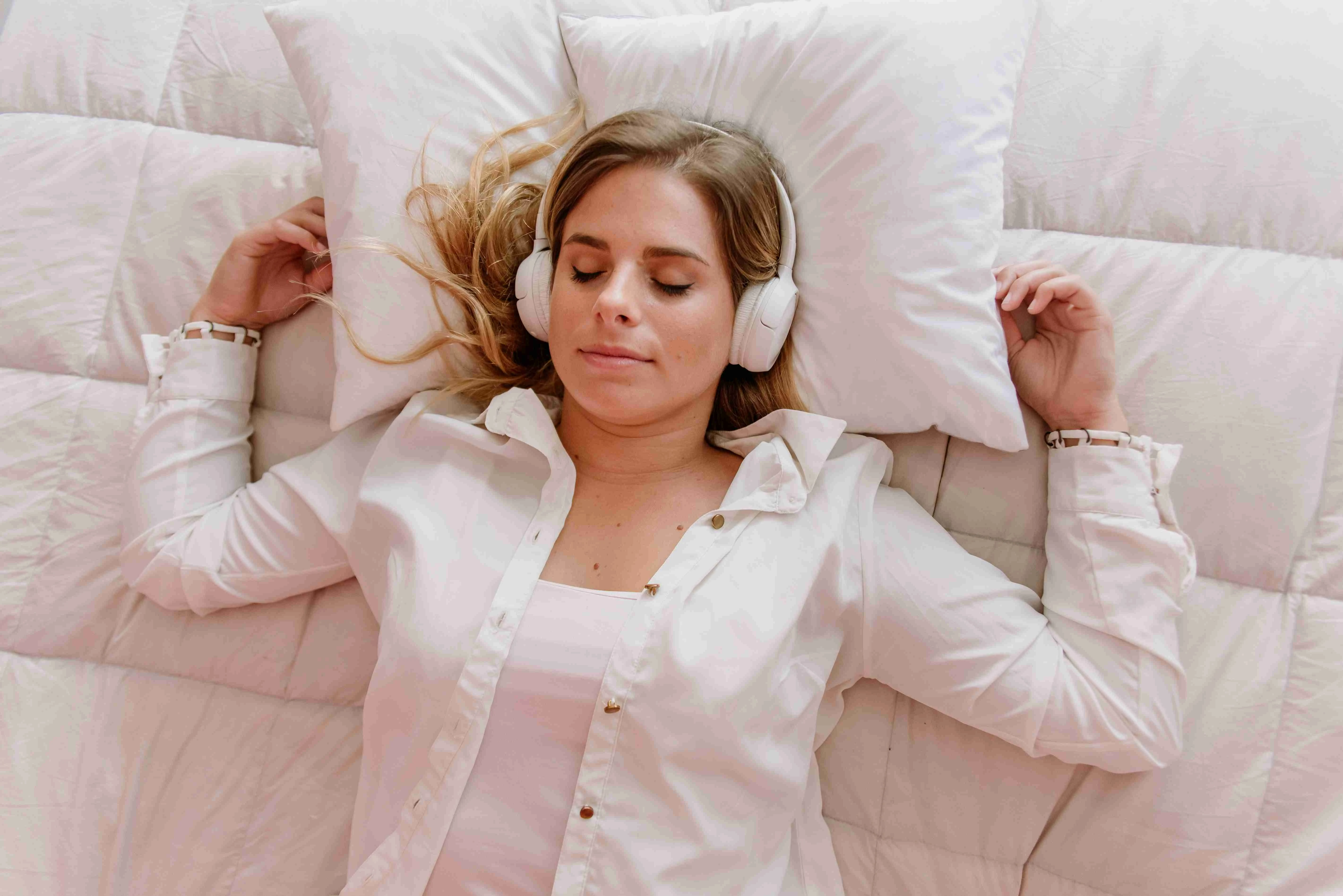In the realm of brain waves, alpha waves play an important role in influencing our state of mind and overall well-being. These oscillations are an essential key to enhancing sleep quality and promoting relaxation.
In this article, we will help you understand alpha waves; you'll uncover the profound impact they can have on your daily life, offering insights into achieving more restful sleep.
Understanding Brain Waves
Before delving into the specifics of alpha waves, it's essential to grasp the fundamental concept of brain waves. These electrical impulses, generated by the synchronized activity of neurons in the brain, fluctuate at different frequencies, each associated with distinct cognitive and physiological states.
From the high-frequency gamma waves linked to active learning and information processing to the slow, restorative delta waves during deep sleep, the brain's electrical activity paints a captivating picture of our mental and physical well-being.
What Are Alpha Waves?

Alpha waves, a type of brain waves, nestled in the middle of the frequency spectrum, are often referred to as the "relaxation rhythm." These gentle oscillations are most prominent when you're in a state of wakeful relaxation, such as during light meditation or when your mind is at ease, yet alert.
Unlike the higher-frequency beta waves associated with active thinking and problem-solving, alpha waves signify a more tranquil and receptive state of mind.
The Role of Alpha Waves in Sleep
While alpha waves are typically associated with wakefulness, they play a crucial role in the transition to sleep and the maintenance of high-quality slumber.
As you begin to drift off, your brain waves gradually shift from the faster beta frequencies to the slower alpha and theta ranges.
This transition is a natural part of the sleep onset process, signaling the brain's preparation for rest and rejuvenation. To better understand this process, visit How Sleep Works.
Disrupted Alpha Wave Activity and Its Impact on Sleep
When alpha wave activity is disrupted or insufficient, it can lead to difficulty falling asleep, staying asleep, or experiencing restorative sleep.
Conditions like stress, anxiety, and certain neurological disorders can interfere with alpha wave production, leading to restless or fragmented sleep. This is why managing anxiety and stress levels can help restore the natural flow of brainwave patterns, promoting better sleep.
Benefits of Alpha Waves for Relaxation and Sleep
Alpha waves, with a frequency range of 8-12 Hz, are key players in creating a peaceful, relaxed state of mind, which is essential for relaxation and quality sleep. Here’s how they benefit both relaxation and sleep:
Stress Reduction
Alpha waves help reduce the activity of the sympathetic nervous system (responsible for the fight-or-flight response). As they increase, they promote a sense of calm, which is essential for unwinding before sleep.
This reduction in stress and anxiety helps the brain enter a more peaceful, sleep-ready state.
Improves Sleep Onset
Alpha waves are closely tied to the transition from wakefulness to the early stages of sleep.
By enhancing alpha wave activity, people can experience faster sleep onset and avoid the difficulty of lying awake in bed, anxious, or overthinking.
Improved Focus and Concentration
During periods of wakefulness, alpha waves also help improve focus and concentration by calming the mind.
This is especially useful in situations that require sustained attention but without overstimulation, which can be a barrier to relaxation and sleep. When you're able to focus calmly, you experience less mental clutter that can keep you awake at night.
Enhanced Creativity
Alpha wave activity is linked to periods of creative insight and problem-solving. The brain is more open to forming new connections and finding solutions when alpha waves are active. This cognitive flexibility can lead to better emotional regulation and a more relaxed state conducive to sleep.
Techniques to Increase Alpha Wave Activity
If you're interested in harnessing the power of alpha waves, there are several techniques you can explore:
Meditation
Meditation, especially practices like mindfulness and deep breathing, is a well-known way to boost alpha wave activity. When you focus your attention in a calm, non-judgmental way, it helps slow down brain activity from the faster, stress-related beta waves to the more relaxed alpha waves.
Regular meditation can significantly reduce anxiety, enhance emotional regulation, and improve sleep onset. It also encourages a deep sense of relaxation and calm that helps you transition smoothly from wakefulness to sleep.
Biofeedback

Biofeedback involves using electronic monitoring devices to measure physiological functions like heart rate, muscle tension, and brainwave activity. With this real-time feedback, you can learn to control your alpha wave activity by consciously shifting your brain's frequency.
Biofeedback trains you to induce more alpha waves, especially in stressful situations. Over time, it can help you maintain a relaxed state and reduce anxiety, which is crucial for improving both your mental clarity and sleep quality.
Sensory Deprivation
Sensory deprivation, such as floating in a sensory isolation tank, minimizes external stimuli (like light, sound, and touch). This promotes a deep state of relaxation, leading to an increase in alpha wave activity as the brain is not overwhelmed by sensory input.
The stillness and quiet promote mental relaxation, reduce stress, and stimulate alpha wave production, enhancing your ability to relax and sleep deeply.
Alpha Wave Music and Sound Therapy

In recent years, the use of alpha-wave music and sound therapy has gained popularity as a means of promoting relaxation and enhancing sleep quality.
These specially designed audio tracks, often incorporating binaural beats or isochronic tones, are believed to entrain the brain to resonate at the desired alpha frequency, potentially inducing a state of relaxation and improved sleep.
Alpha Intrusion
Alpha intrusion refers to the phenomenon where alpha waves, which are typically associated with relaxed wakefulness, appear during sleep, disrupting the natural sleep cycle.
This abnormal presence of alpha waves can interfere with the transition into deeper stages of sleep, particularly REM and slow-wave sleep, both of which are essential for restorative rest.
What is Alpha Intrusion?
Alpha intrusion occurs when the brain's alpha wave activity is present during sleep stages, especially during the deeper stages of sleep where delta and theta waves should dominate.
Normally, alpha waves are associated with a relaxed state of wakefulness, but when they intrude into sleep, they can disrupt the natural sleep architecture. This can make it harder for individuals to reach deep, restorative sleep stages.
Causes of Alpha Intrusion
Several factors can contribute to alpha intrusion, including:
- Stress and Anxiety: High levels of stress or anxiety can cause the brain to remain more active than it should be during sleep. This results in alpha waves intruding into sleep stages where they normally wouldn't occur.
- Poor Sleep Hygiene: Behaviors like excessive screen time before bed, irregular sleep schedules, or consuming caffeine late in the day can make it harder for the brain to transition smoothly into sleep, leading to disturbances in normal brainwave patterns. Practicing good sleep hygiene can help establish healthier habits that promote better sleep quality.
- Sleep Disorders: Conditions such as insomnia, sleep apnea, and restless leg syndrome can interfere with normal sleep cycles, causing alpha waves to intrude into deeper sleep stages.
- Caffeine or Stimulant Use: The consumption of stimulants, particularly caffeine, can activate the brain and keep it in a higher state of alertness, preventing the transition into deeper sleep stages and allowing alpha waves to persist during sleep.
- Neurophysiological Factors: Some neurological conditions, such as certain forms of epilepsy or other brain abnormalities, can result in abnormal alpha-wave activity that interferes with normal sleep.
Effects of Alpha Intrusion on Sleep
- Reduced Sleep Quality: Alpha intrusion can prevent the brain from entering the deeper, more restorative stages of sleep (such as slow-wave sleep and REM sleep). As a result, people may feel less rested upon waking, even after spending a full night in bed.
- Increased Nighttime Wakefulness: Because alpha waves are linked to a wakeful state, their presence during sleep may cause individuals to experience more fragmented sleep, wake up frequently, or have difficulty staying asleep.
- Decreased REM Sleep: REM sleep, which is vital for memory consolidation and emotional regulation, can be compromised by alpha waves. This leads to poor cognitive function, mood disturbances, and a lack of restorative benefits from sleep.
- Difficulty Falling Asleep: The presence of alpha waves during sleep onset can make it more difficult to transition from wakefulness into sleep, prolonging the time it takes to fall asleep and disrupting the natural sleep onset process.
Practical Tips for Better Sleep with Alpha Waves
If you're seeking to leverage the power of alpha waves for improved sleep quality, here are some practical tips to consider:
Establish a Relaxing Bedtime Routine

Engage in activities that promote alpha wave production, such as light stretching, deep breathing exercises, or listening to calming music. Incorporating these in your bedtime routine can help you fall asleep faster.
Create a Sleep-Friendly Environment
Ensure your bedroom is cool, dark, and quiet, minimizing external stimuli that could disrupt your sleep and alpha wave activity.
Experiment with Alpha Wave Aids
Consider using alpha wave music, binaural beats, or other audio tools designed to induce a relaxed alpha state before bedtime.
- Neurofeedback Devices: These specialized devices measure brain wave activity and provide real-time feedback, allowing users to train themselves to increase alpha wave production.
- Alpha Wave Music and Apps: Numerous apps and audio programs are available that claim to induce alpha wave states through binaural beats, isochronic tones, or other auditory stimulation techniques.
- Light and Sound Machines: These devices combine visual and auditory stimulation, such as flickering lights and pulsing tones, to entrain the brain into an alpha wave state.
Practice Mindfulness
Incorporate mindfulness techniques, such as body scans or guided imagery, to calm your mind and promote alpha wave activity as you drift off to sleep.
Potential Risks and Considerations
While alpha wave stimulation is generally considered safe, it's important to be mindful of potential risks and considerations:
Photosensitive Epilepsy
For individuals with photosensitive epilepsy, certain types of alpha wave stimulation, such as flickering lights or rapidly changing visual patterns, may trigger seizures.
Headaches or Dizziness
Some people may experience mild headaches or dizziness when exposed to certain alpha wave stimulation techniques, particularly those involving binaural beats or isochronic tones.
Individual Differences
The effectiveness of alpha wave stimulation can vary from person to person, and some individuals may not experience the desired effects
FAQs
Can alpha waves help with insomnia?
While alpha waves are not a cure for insomnia, increasing alpha wave activity can promote relaxation and improve sleep quality, potentially alleviating some symptoms of insomnia.
Are alpha waves safe for children?
Most alpha wave stimulation techniques are generally considered safe for children, but it's essential to consult with a healthcare professional, especially for younger children or those with specific medical conditions.
Can alpha waves improve academic performance?
Alpha wave stimulation may enhance focus, concentration, and cognitive function, potentially benefiting academic performance.
How long does it take to see the benefits of alpha wave stimulation?
The timeframe for experiencing the benefits of alpha wave stimulation can vary from person to person. Some individuals may notice effects within a few sessions, while others may require more consistent practice over a longer period.
Can alpha waves help with anxiety or depression?
While alpha waves are not a substitute for professional treatment, their ability to promote relaxation and reduce stress may provide some relief from anxiety or mild depression symptoms. However, it's crucial to seek medical advice for more severe cases.
Conclusion
Whether you choose to explore meditation, biofeedback, or the myriad of alpha wave technologies available, the key lies in finding the approach that resonates best with your individual needs and preferences.
Karen Barnard
Karen is a Human Movement Science expert and a certified sports nutrition and massage therapist. At Sleepiverse, she combines her passion for human movement science and sleep health to educate herself and her readers about healthier sleep. In addition to writing articles, Karen manages a fitness studio offering private training, athletic conditioning, and sports massage therapy. She focuses on providing people with a holistic environment for people to reach their health goals, often incorporating stretch therapy to promote mental tranquillity and help people improve their sleep.


